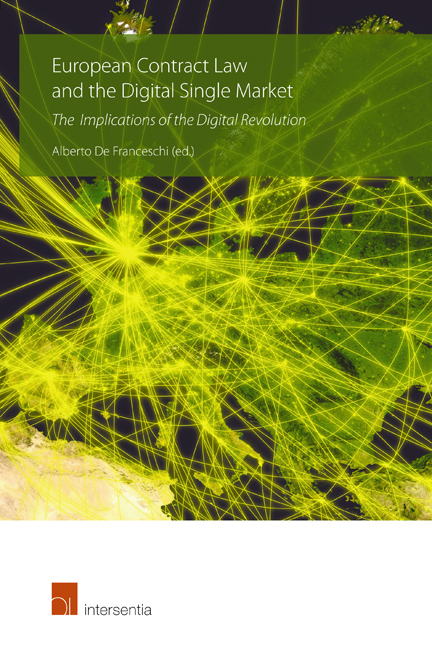Book contents
- Frontmatter
- Preface
- Contents
- List of Authors
- European Contract Law and the Digital Single Market: Current Issues and New Perspectives
- PART I THE IMPACT OF DIGITAL TECHNOLOGY ON PRIVATE LAW RELATIONSHIPS
- PART II DATA AS A TRADEABLE COMMODITY AND THE NEW INSTRUMENTS FOR THEIR PROTECTION
- PART III THE LEGISLATIVE INSTRUMENTS FOR A DIGITAL SINGLE MARKET
- PART IV NEW FEATURES OF STANDARD CONTRACTS IN THE DIGITAL MARKET
- Standard Terms and Transparency in Online Contracts
- Contracts Concluded by Electronic Means in Cross-Border Transactions. ‘Click-Wrapping’ and Choice-of-Court Agreements in online B2B Contracts
- PART V ONLINE PLATFORMS IN THE ‘SHARING ECONOMY’
Standard Terms and Transparency in Online Contracts
from PART IV - NEW FEATURES OF STANDARD CONTRACTS IN THE DIGITAL MARKET
Published online by Cambridge University Press: 12 December 2017
- Frontmatter
- Preface
- Contents
- List of Authors
- European Contract Law and the Digital Single Market: Current Issues and New Perspectives
- PART I THE IMPACT OF DIGITAL TECHNOLOGY ON PRIVATE LAW RELATIONSHIPS
- PART II DATA AS A TRADEABLE COMMODITY AND THE NEW INSTRUMENTS FOR THEIR PROTECTION
- PART III THE LEGISLATIVE INSTRUMENTS FOR A DIGITAL SINGLE MARKET
- PART IV NEW FEATURES OF STANDARD CONTRACTS IN THE DIGITAL MARKET
- Standard Terms and Transparency in Online Contracts
- Contracts Concluded by Electronic Means in Cross-Border Transactions. ‘Click-Wrapping’ and Choice-of-Court Agreements in online B2B Contracts
- PART V ONLINE PLATFORMS IN THE ‘SHARING ECONOMY’
Summary
INTRODUCTION
The idea of contract is based on consent: a party voluntarily enters into an agreement by which he imposes obligations on himself in (most of the time) exchange for something. Therefore, traditionally, a contract is defined as an agreement. Thus, the DCFR states that ‘[a] contract is an agreement which is intended to give rise to a binding legal relationship or to have some other legal effect’. The proposals for a Directive on contracts for the supply of digital content and for online and other distance sales of goods also define a contract as ‘an agreement intended to give rise to obligations or other legal effects’. Then, in this view of contract, by the interplay of offer and acceptance, the parties bind themselves intentionally, creating a mutual relationship.
But even in a negotiated contract, which contract law doctrine usually presumes to be balanced, the agreement, or more precisely the consent of the parties to the agreement, is far from perfect. Most of the time, the parties are not aware of or do not understand the terms of the contract beyond the core of the bargain, usually the price and the goods or services provided. Consent (or non-consent) has different levels. Thus, the ignorance of a party may refer to the existence of a contractual relationship, or the existence, content or meaning of some of the terms of the contract.
Contract law recognises that a person can legally bind himself without knowing that he has done so, through his purported or hypothetical intention. Then, via a legal fiction, the law creates or supplements a contractual relationship. Today, the prevailing view on contract formation is the objective principle, which implies that the agreement must be understood from the external perspective of a reasonable observer, and not necessarily from the actual perception or understanding of the parties. The reasons for this construction may be varied, but the main rationales seem to be the protection of the expectations of the other party, efficiency and legal certainty.
The role (and existence) of consent has been particularly discussed with regard to standard form contracts. Thus, adhesion contracts have been critiqued on the basis that they lack real assent by the non-drafting party.
- Type
- Chapter
- Information
- European Contract Law and the Digital Single MarketThe Implications of the Digital Revolution, pp. 189 - 208Publisher: IntersentiaPrint publication year: 2016



